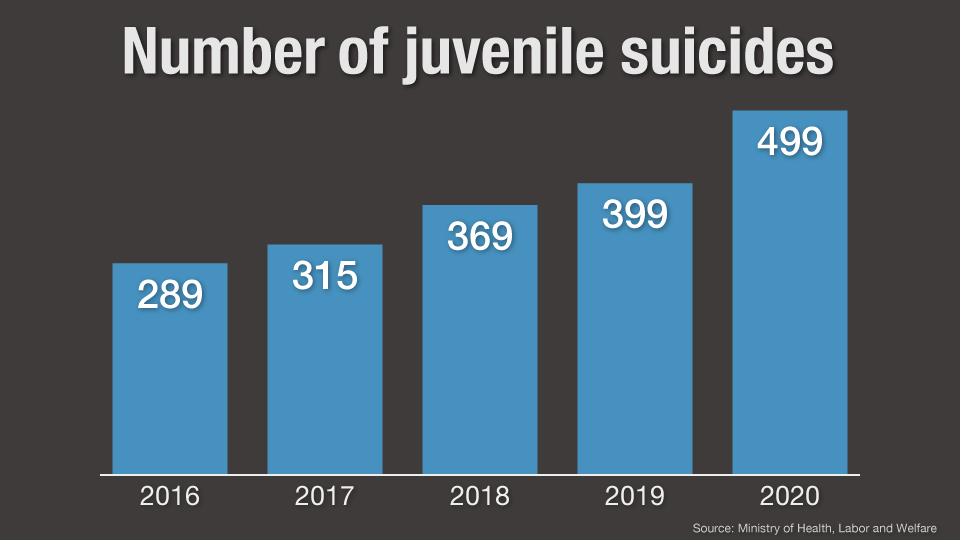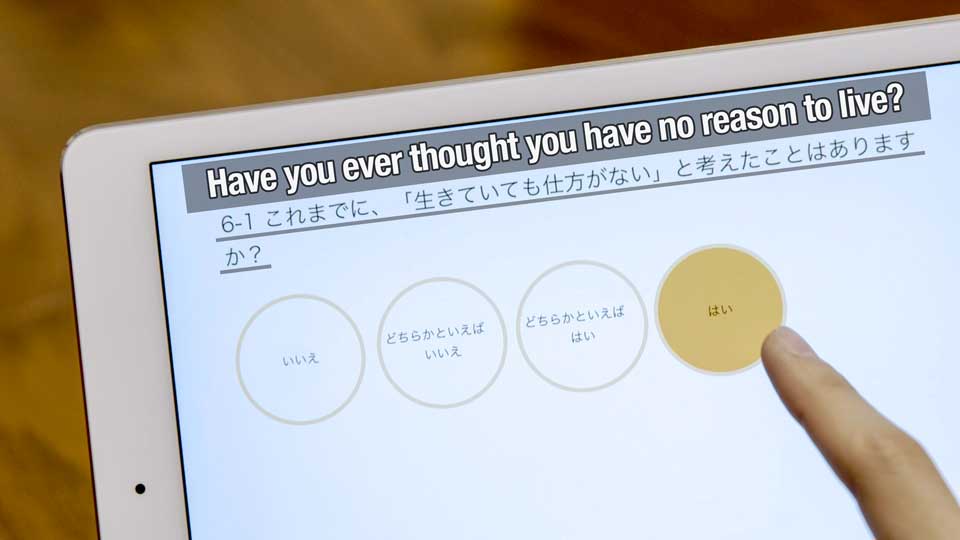Japan's suicide rate has been declining in recent years but the number of juvenile suicides has been heading in the opposite direction. The figure has increased every year since 2016, and spiked dramatically in 2020 with 499 deaths, according to the Ministry of Health, Labour and Welfare.
That was a leap of more than 25 percent from the previous year, and though the Ministry says the main reasons have remained more or less the same — poor academic performance, career uncertainty and family problems — some experts believe the pandemic has played a significant role.

The pandemic factor
"The reasons for suicide are complex, involving layers of risk factors, including biological, psychological and environmental ones," says Dr. Tanaka Kyoko of the National Center for Child Health and Development. "The pandemic has increased anxiety and stress among children. It may have given a push to kids who had been right on the brink."
The Center has conducted a series of online surveys to gauge the physical and mental impact of the pandemic on youths in Japan.
One survey of 715 children conducted last November and December found that symptoms of moderate or worse depression were present in 15 percent of elementary students from grades four to six, 24 percent of junior-high students, and 30 percent of high-school students.
The study also revealed that 24 percent of all respondents have had suicidal thoughts, while one in six children said they had self-harmed, including hitting themselves or pulling out their hair.
School environment
School closures in the early months of the pandemic had a significant impact on children, creating social isolation. Experts say that spending more time at home can have negative outcomes for adolescents.
Tokyo-based non-profit 3keys runs the website Mex for teenagers who feel they cannot talk to their family or friends, even when they face problems such as abuse, bullying or suicidal thoughts.
The site connects users with the appropriate help for their concerns, as well as offering a space where worried children can post their thoughts without seeking further intervention.

Moriyama Takae, a founder of the group, says that around last April and May, when schools were shut, many of the posts were about family trouble, including abuse. "There are a certain number of children suffering both physically and emotionally in homes that are not places of safety for them," she says.
Here is a sample of the posts:
"I don't have a place at home. I don't have any friends I can rely on. I wandered around for three hours last night. I don't know what to do."
"I'm tired. I need a rest. Help me. I want to die. I have no place to be or escape to."
"My family isn't getting along and I'm suffocating here. As a kid, I can't do anything, and I have to put up with it. But it's so hard."
Moriyama says she has long been concerned about the pressure teenagers face from being evaluated constantly at home and school. "I thought we needed to create a place where they don't have to prove anything," she says.
And last month her organization did just that. The facility in Tokyo's Shinjuku district offers free showers, washing machines, places to nap and most importantly, a safe place.

Risk assessment
Early detection is a key strategy in the prevention of youth suicide. Since students spend considerable time in schools, their teachers seem well placed to read how the children are feeling, but it's not easy for them to ask them directly about suicidal thoughts.
To help change that dynamic, a group of experts has developed a tablet-based suicide screening tool it calls "Risk Assessment of Mental & Physical Status," or RAMPS.
"The device will help teachers or school nurses identify risk factors among students, including those who are not showing any obvious warning signs," says Kitagawa Yuko of the University of Tokyo's Center for Research on Counseling and Support Services.
RAMPS consists of 11 mental health questions tailored toward young people and takes about three minutes to administer.

Based on the answers, RAMPS suggests follow-up questions or recommends seeking professional help.
Nearly 70 junior high and high schools across Japan are now using the system, mostly in nurse's offices and at annual checkups.
Kitagawa says that asking about children's wellbeing, including about suicidal thoughts, is an important strategy. She gives the example of a junior high school student who appeared cheerful. The RAMPS process revealed that he was actually having suicidal thoughts and planning to take action.
"I asked him why he decided to open up to a stranger like me about such personal issues," she says. "He told me he had never talked about it because he had never been asked."
Kitagawa says some people still believe that asking children about their wellbeing will increase suicide rates, but studies have found that not to be true.
"In Japan, it's still not common to speak about mental health problems," she says. "We're sending a message to students that it's perfectly OK to talk about mental health issues by using this device, and finding a way to save young lives."
'TALK' principle
If you suspect a child may be feeling suicidal or struggling to cope, Dr. Tanaka of the National Center for Child Health and Development says it is important to avoid rushing the process. She recommends following four key principles:
T - Tell them that you care and are concerned for their wellbeing.
A - Ask directly if they are thinking about suicide.
L - Listen to and recognize their feelings.
K - Keep them safe, and seek professional help.
*Mex provides information on support hotlines (e-mail, telephone, Line etc.) for children who are seeking help.
https://me-x.jp
(This link will take you to an external website.)

